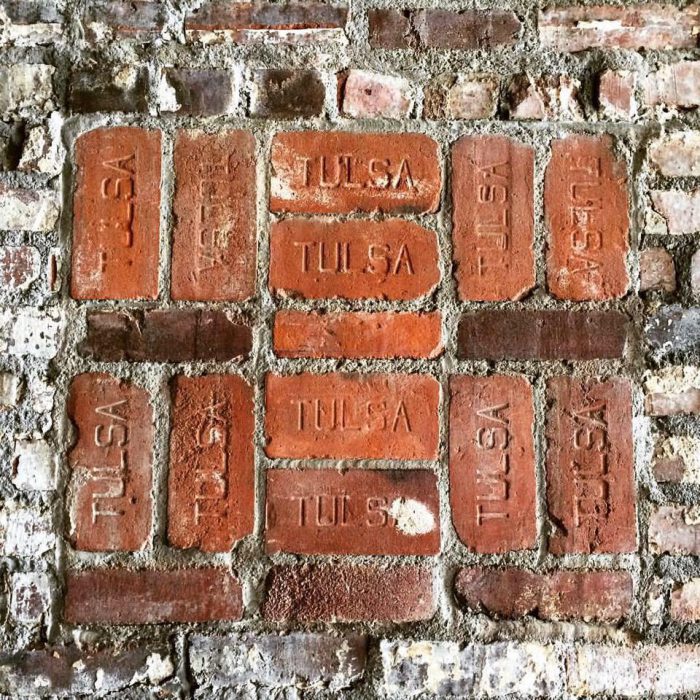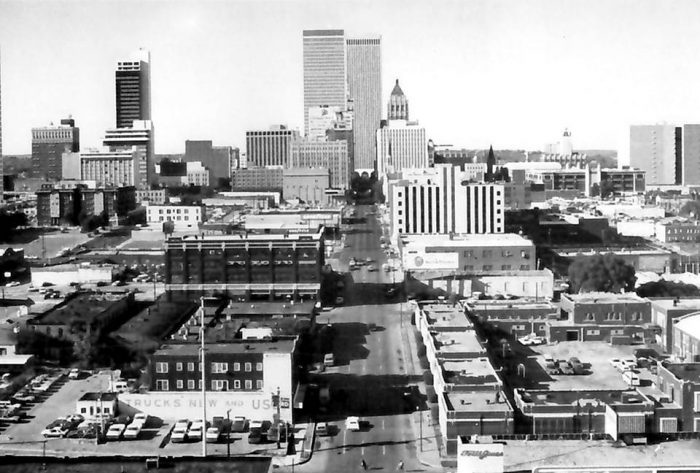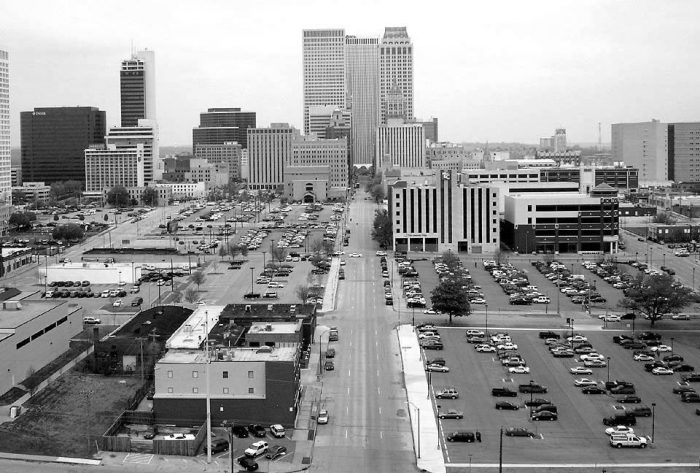Tulsa’s
Architectural
Voice

Who We Are
OUR MISSION
Tulsa Foundation for Architecture champions the art of good design and celebrates Oklahoma’s architectural heritage through education, advocacy and archives.
We are Tulsa’s voice for architecture and design.
OUR CORE VALUES
- Collaboration: We leverage collective genius.
- Creativity: We think outside the box.
- Passion: We are committed in heart and mind.
- Quality: What we do, we do well.
- Impact: Our work makes a positive difference in our community.
- Education: We share our knowledge with others.
OUR EIGHT STRATEGIC GOALS
- Systematically process, catalog, and digitize the TFA archives to expand availability both online and via appointment.
- Advocate for the preservation and rehabilitation of Oklahoma’s significant architecture.
- Sustain TFA through broad-based fundraising efforts that meet operational needs and allow the organization to expand its mission-driven work.
- Implement consistent marketing efforts that engage TFA audiences in order to drive program participation, sales, and increased brand/mission awareness.
- Create strategic messaging to position TFA as the primary nonprofit organization in Tulsa for architecture, design, and historic preservation.
- Regularly host a diverse array of architecture and design based programming and events for all ages in the community and at The Tulsa Center for Architecture and Design to meet strategic outcomes and generate revenue.
- Form programmatic partnerships with a diverse group of individuals and organizations to expand TFA audiences and support TFA programs.
- Take intentional steps towards making TFA a more diverse, equitable, accessible and inclusive organization.
2025 Leadership
President: Patty Atherton, Elite Title Services
President Elect: Al Pagano, AIA, The McIntosh Group
Secretary: Maggie Brown, Animal Aid of Tulsa
Treasurer: Kayla Lee, Lee Simon Design
Immediate Past President: Sean Nanny, BAM Properties
Trustees
Ken Brune, The Brune Law Firm
Kristi Eaton, Ke Comms
Ranan Gangel, KFC Engineering
Mindy Gray, AIA, GH2 Architects
Briana Hefley Shepard, Tulsa Garden Center
Misty Roden Lord
Kendall Mordhorst, Mordhouse, LLC
Rick Phillips, Interior Designer
James E. Turner, AIA, Cyntergy
Sarah Vespasian, Office Interiors
Kate Wallace Helm, Wallace Helm Design
Advisory Council
David Atkinson, One Property Management
Rex Brown
Roger Coffey, AIA, Olsen Coffey Architects (retired)
Megan Farley, Dewberry Architects
Nancy Hermann, Tulsa Performing Arts Center (retired)
Shane Hood, Align Design
Kimberly Honea
Matt King, AIA, King Architectural Solutions
Kristen LaBass, LaBass Design
Kip Leikam, Leikam Investments
Lanny McIntosh, FAIA, The McIntosh Group, LLC (retired)
Leisa McNulty, AIA, LMMA Design
Julie Miner, INCOG
Martin L.J. Newman, Walter & Associates (retired)
Scott Pohlenz, Pohlenz Architects
Ted Reeds, Ted Reeds Architecture LLC/ University of Oklahoma
Mark Ross
Christy Craig Thames, OwnTulsa® Real Estate
Mary Lee Torbert, ASID
Tom Wallace, Wallace Design Collective (retired)
Susie Wallace
Michael Wallis, Author
Sadly Missed
Without Herb Fritz, AIA, TFA would not be here today.
TFA will always be grateful to the late George R. Kravis II for his enduring inspiration and support.
We deeply miss our friend, graphics guru, and advisor, Kerry Walsh.
We are eternally grateful to John Mabrey for his ongoing support.
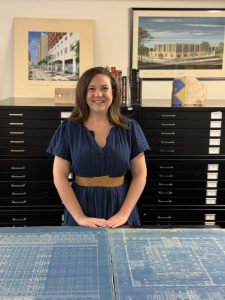
Malinda Blank
Executive Director
Pronouns: she/her/hers
Malinda Blank is a Tulsa native who has devoted fifteen years to the nonprofit, arts management, and museum worlds. She earned her Masters of Fine Art from California State University, Chico and her BA in Fine Art from the University of Southern California. Her professional experience includes being the Chief Registrar at Gilcrease Museum, a fundraiser for the Tulsa Area United Way, and the Business Manager for FireThief Productions.
From a young age, Malinda has been passionate about serving her community. She was selected for and completed multiple non-profit leadership programs and dedicates her time to serving on numerous Boards of Directors for local nonprofits.
As a practicing artist, Malinda’s work focuses on textiles and heritage art through her business Blank Canvas Craft.
Email Malinda at director@tulsaarchitecture.com

Lindsey Neal Kuykendall
Curator of Public Engagement, Independent Contractor
Pronouns: she/her/hers
Lindsey Neal Kuykendall began serving Tulsa Foundation of Architecture in January of 2022 as an independent contractor in the role of Curator of Public Engagement, where she leads the research and implementation of TFA tours, programs, and events.
Prior to this, Lindsey served as the Events Manager at Philbrook Museum of Art for almost 12 years. In this role she executed an extensive slate of public and private events, including high-profile events that earned features in Vogue and Martha Stewart Weddings, and led the museum’s film production program.
As a writer and historian specializing in music history, she has published with Tulsa People Magazine and served as a contributing editor of This Land Press.
As a violinist and composer, she co-founded Wild Mountain Studios in Osage County where she and her husband Mark produce recordings and film scores. In 2024, they launched the OPAL Collection: Oklahoma Preservation of Artistic Legacy, and their record label, Yield Recordings: Telling Oklahoma Story through Sound.
Lindsey holds a Certificate of Business Leadership in Creative Industries from Sotheby’s Institute of Art in London and is currently studying Music Composition through Juilliard’s Extension program out of New York.
Email Lindsey at: publicengagement@tulsaarchitecture.com
Tulsa Foundation for Architecture was created in the 1990s to change the way Tulsa sees itself and treats its built environment.
It was at a time when downtown Tulsa was being abandoned, historic buildings leveled for parking, street improvements failed the pedestrian, zoning codes favored the automobile and there was a lack of overall vision.
Tulsa’s success with the federal Urban Renewal program in the second half of the 20th century far outpaced many of its competitors. Tulsa forever altered the architectural landscape of downtown, as wide swaths of smaller-scale buildings dating to the turn of the 20th century fell to the wrecking ball to make way for new development. In Tulsa’s case, Urban Renewal left a legacy of significant midcentury structures in its wake, such as the Yamasaki-designed Williams Tower – so whether one considers Urban Renewal a raging success or a disaster is a matter of perspective.
Urban Renewal was designed to bring people back downtown in an era of rapid suburbanization. Shoppers abandoned the city center for the mall, and new highways cut downtowns off from residential neighborhoods. This period also gave rise to a rash of demolitions by downtown property owners for surface parking lots. Highways rammed through close-in historic neighborhoods. By the late 1980s, much of Tulsa’s beautiful urban fabric had become a sea of asphalt. Something had to change.
In 1995, a group of architects and preservationists formed a new nonprofit to provide a credible voice and expertise in the area of historic preservation. Tulsa Foundation for Architecture was born out of AIA Eastern Oklahoma, the local chapter of the American Institute of Architects. AIA needed a repository for collections of original architectural drawings. The community needed a nonprofit organization to provide expertise and leadership in historic preservation, urban design and to educate the community about Tulsa’s diverse architecture.
Elaine Bergman, who was then director of AIA Eastern Oklahoma, brought together local architects Ted Reeds, Lanny McIntosh, Herb Fritz, and Leisa Marshall McNulty along with engineer Tom Wallace and realtor Marty Newman. This group of dedicated stewards of our built environment founded Tulsa Foundation for Architecture (TFA). Elaine Bergman ultimately became TFA’s first executive director and instituted many programs.
Our first ambitious effort was to deliver city design conferences that were patterned after the “Mayors Institute on City Design” (MICD). In partnership with Tulsa’s Mayor, an MICD alumni, AIA Eastern Oklahoma and Tulsa Foundation for Architecture created dynamic day-long events in order to bring our Mayor’s national experience home. In the following years we observed transformative change from the almost two thousand attendees. Participants included city managers, city planners, key staffers representing streets and parks, architects, realtors, real estate owners, neighborhood representatives, educators and the press. These events, held over a period of several years, proved to be highly influential and led to a new vision in our community – a vision where design matters.
Today, TFA continues to build on its original mission to serve as a resource that recognizes, records and preserves the built environment, and advocates quality future development that enhances Tulsa’s livability. Creating a culture that embraces the value of our architectural history is central to TFA’s purpose. Please sign up for our email list to stay in the know about our events and tours.
TFA believes that architecture is not only one of the fine arts, but that it is the most complex and vital art form to mankind. Our buildings are cultural mirrors; they reflect the technology, social trends, economic history, value systems and aesthetic movements of the time of their creation in a manner that other art forms rarely evoke. To preserve historic buildings from every period is a way of traveling back in time, allowing us a glimpse into the mind of people who lived hundreds of years ago. We can learn tremendous amounts about other art forms, technology and ways of life by looking at the smallest of details: nails, bricks, locks, hinges, lighting and plumbing fixtures and on and on. And, like the other great art forms, the best buildings display exemplary craftsmanship. One of TFA’s greatest passions is to share the history and artistic progression of Tulsa’s diverse architecture with our community through tours and other programming.
TFA also owns an extensive collection of original architectural drawings of many significant Tulsa buildings and residences, such as the Medical Arts Building, Warehouse Market, Southern Hills Country Club, the Tulsa Assembly Center, The Mabee Residence, and the Otis McClintock Residence. TFA’s Archives also hold architectural periodicals (Pencil Points, Progressive Architecture, Architectural Forum, and Architectural Record) dating from 1920 to 1980, newspaper clippings, a technical library, photographs, project specifications and artifacts. No other institution in Tulsa gathers this material.
Photo Credit: Boston Ave 1978- Beryl Ford Collection. Boston Ave 2005- Ed Sharrer.
Tulsa Foundation for Architecture makes its home in the Ponca City Savings & Loan building, a striking 1956 landmark designed by Tulsa architect Robert Buchner. The building houses TFA’s offices and Archives, a library, conference room and exhibit space. TFA shares the space with AIA Eastern Oklahoma.
We Value Diversity, Equity, & Inclusion
Tulsa Foundation for Architecture recognizes that ability, culture, ethnicity, gender, opinion, race, religion, sexual orientation, and other aspects of diversity have a profound impact on shaping individuals and communities. We are actively committed to creating inclusive spaces and programming.
We Honor Those Who Have Come Before Us.
TFA Land and Peoples Acknowledgement
The Tulsa Foundation for Architecture recognizes the land on which Tulsa is built is the ancestral homeland of several Indigenous nations, including the Osage, Muscogee (Creek), and Cherokee Nations. We honor the peoples who lived here before Oklahoma was a state.
We acknowledge the deep and enduring connection that these Tribes have to this land, and we honor the past, present, and future generations who have cared for it as well as the numerous, ongoing contributions of Indigenous people to the city we call home.
We also acknowledge the painful history of the Tulsa Race Massacre of 1921, during which the thriving Black community of Greenwood was destroyed in an act of racial violence. This event is a stark reminder of the injustices that have occurred on this land, and the resilience of those who have fought, and continue to fight, for justice and equality.
As we work to preserve and celebrate Tulsa’s architectural heritage, we commit to reflecting on the complex and layered histories of this land and its indigenous peoples, and to fostering a community that honors and respects all those who have shaped it.
Annual Reports
Download TFA’s 2025 Annual Report HERE.
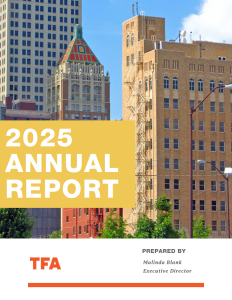
Download TFA’s 2024 Annual Report HERE.

Download TFA’s 2023 Annual Report HERE.
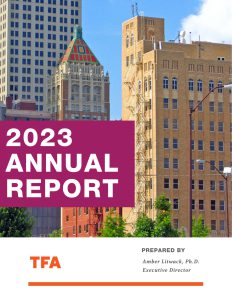
Download TFA’s 2022 Annual Report HERE.
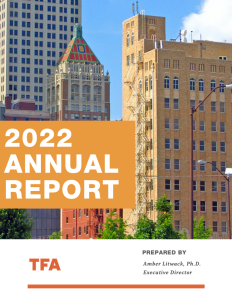
Advocacy at TFA
TULSA FOUNDATION FOR ARCHITECTURE ADVOCACY STATEMENT
Tulsa Foundation for Architecture advocates for the preservation of our city’s historic structures, which serve as vital links to our past and building blocks for our future. Our architectural heritage, visible in the stunning Art Deco landmarks, mid-century modern homes, and numerous other historic buildings, tells the story of Tulsa’s evolution from a frontier town to a modern city.
Historic preservation is not just about saving old buildings; it’s about recognizing and honoring the stories, craftsmanship, and cultural narratives they embody. These structures are irreplaceable resources that provide a tangible connection to our heritage and identity, offering educational opportunities and fostering a sense of place and community pride.
Preservation contributes to Tulsa’s economic vitality, attracting tourism, supporting local businesses, and enhancing property values. By revitalizing and repurposing historic buildings, we can promote sustainable development, reducing the environmental impact of new construction and preserving the unique character of our neighborhoods.
We call upon policymakers, community leaders, and citizens to join us in safeguarding Tulsa’s architectural legacy. Together, let us cherish and protect the architectural treasures that make Tulsa a vibrant and distinctive place to live, work, and visit.
TFA Advocacy Action Steps:
- Education and Awareness: We organize public workshops and tours to educate citizens about the importance of historic preservation and the stories behind Tulsa’s significant structures.
- Resource Assistance: We Provide resources to property owners, developers, and local organizations on how to utilize state and federal Historic Tax Credits, file for preservation easements on individual properties, and Historic Preservation (HP) Overlay Zoning.
- Inventory: We maintain an ongoing inventory of historic buildings and neighborhoods to help identify and prioritize advocacy efforts.
- Monitor Legislation: We monitor legislation that impacts historic preservation and engage in public education and advocacy efforts, as appropriate.
- Emergency Intervention: We take immediate action to advocate for the protection of endangered historic Tulsa structures at risk of demolition or severe alteration.
- Social Media Campaigns: We utilize social media campaigns to raise public awareness of the value of historic preservation and promote the success stories of restored and repurposed buildings.










